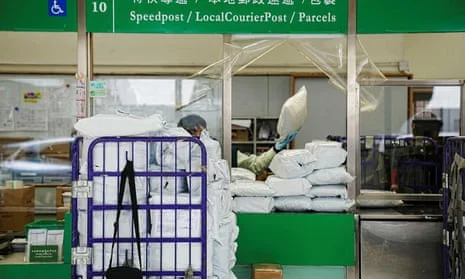
What Does Hong Kong’s Postal Service Suspension Mean for U.S.-China Trade Relations?
In a significant escalation of the ongoing U.S.-China trade war, Hong Kong's postal service has announced a halt to all package shipments to the United States. This decision comes ahead of President Trump's impending implementation of new tariffs that could dramatically affect trade between the two regions, raising questions about the future of Hong Kong as a neutral trading partner.

The suspension is a direct response to Trump's recent order that eliminates the de minimis exemption, allowing packages valued under $800 to enter the United States tariff-free. Following its closure on May 2, U.S. Customs will begin collecting tariffs that had previously been waived, prompting Hongkong Post to cease accepting shipments.
In its announcement, the postal service criticized the U.S. government, stating, "The U.S. is unreasonable, bullying and imposing tariffs abusively." This statement reflects a broader sentiment in Hong Kong regarding the escalating tensions between the two nations, particularly as trade routes begin to shift under the pressures of tariffs.
Currently, the value of goods shipped to the United States from Hong Kong amounts to a staggering $34.8 billion, constituting about 6.5 percent of the city's total exports. With the U.S. as Hong Kong's third-largest trading partner, the potential repercussions of this halt could be far-reaching, affecting not just postal operations but also the larger ecosystem of trade and commerce.
Market reactions have already begun; during trading, Hong Kong's Hang Seng Index dropped by over 2%, reflecting investor concerns over this escalating trade conflict. Experts are warning that the move could disrupt supply chains and lead to increased costs for both consumers and businesses in Hong Kong.
Ben Kostrzewa, a trade expert, stated, "The suspension makes it more challenging for the trade and shipping businesses in Hong Kong," pointing to the delicate balance that the city has maintained as a free port while being under the umbrella of Chinese governance. As the city navigates these challenges, its status as a neutral ground between China and the United States seems increasingly tenuous.
As the situation develops, many are left wondering how Hong Kong will adapt to these new trade realities and what measures could be implemented to mitigate the economic impact on both sides. The larger question remains: Can Hong Kong sustain its unique position amid such rising tensions?
We invite readers to share their thoughts on how this shift could affect global trade and what implications it may have for Hong Kong’s economy. Would you feel comfortable directing your packages through an increasingly turbulent trade landscape?